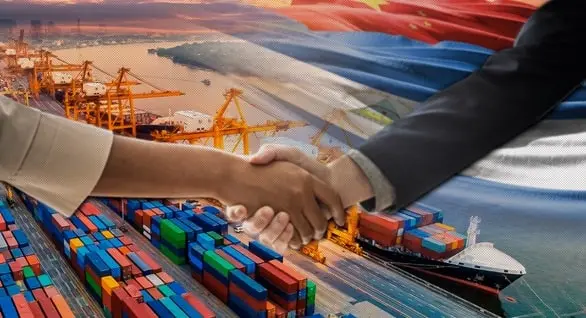If you are into geopolitics, then you might have heard of free trade agreements at some point in your life, right? Well, you see, these kinda agreements are actually treaties or deals made between two or more countries to ease up the whole trade and investment thing. This certainly helps out a lot of people in the countries that are doing the free trade agreement thing, but there are certainly a few aspects you shouldn’t just overlook, you know? And that’s what we are onto today because here we will be taking a good look at the possible advantages and disadvantages of the free trade agreement. Alright, here we go.

Advantages of Free Trade Agreement
1. Economic Growth and How It Helps You Save Big!
First of all, the big deal here is how they spur economic growth and fatten your wallet. Imagine this: FTAs slash those annoying tariffs, leading to price drops of all sorts of stuff. We’re not just talking pennies and dimes, it’s a substantial chunk of change we’re saving! Think about it, the money you’re not spending on these imports can be splurged on other cool things, giving a nice little turbo boost to various sectors of our economy.
2. Increased Exports and Job Opportunities
Here’s where it gets even more exciting. Free trade agreements fling open doors to new markets. What does this mean? A sweet uptick in exports and, you guessed it, more jobs popping up like spring daisies. Industries where we’ve got the upper hand see a major boost. It’s a total win-win, exporters get to ship off more of their goods, and job hunters find new opportunities in these booming sectors.
3. Economies of Scale
Ever heard economists throw around the term ‘economies of scale’? Well, FTAs are all about pushing countries to get really good at certain things. This leads to more production and less spending on making stuff. The cool part? You get to buy these products at lower prices. And for businesses, it’s like hitting the jackpot in efficiency and competitiveness, quite literally!
Also See: Advantages and Disadvantages of International Trade
4. Enhanced Competition
Now, let’s spice things up with a dash of competition, courtesy of FTAs. More players in the market might seem scary for local businesses, but it’s actually a kick in the pants to get better and smarter. What’s in it for you? Top-notch products and services. It’s all about sparking innovation and making sure local companies stay on their toes.
5. Making the Most of What You’ve Got
Countries sitting on piles of raw materials can really cash in with free trade. Picture the Middle Eastern countries with their oil wells. They’re not just sitting pretty, nah, they’re trading their way to a healthier GDP. And for those not so resource-rich? No sweat, they can just import what they need. All in all, in our opinion though, FTAs are like the great equalizers, balancing out these differences.
6. Breaking Up the Monopoly Party
Here’s a little-talked-about gem: FTAs can break up those big, bad monopolies. When foreign businesses step into the ring, it stops monopolies from hogging the market and hiking up prices. This means fairer play and more choices for everyone.
7. Global Cooperation and Cultural Exchange
Last but not least, FTAs aren’t just about the greenbacks. They’re building bridges of international cooperation, cultural exchange, and understanding between nations. It’s not just good for business, it’s great for global harmony and keeping the peace. And we are talking about the global peace here, which is like super important these days, you know?
Disadvantages of Free Trade Agreement
1. The Job Loss Thing
Okay, so first up, let’s chat about job losses, a real thorn in the side when it comes to Free Trade Agreements (FTAs). You might think free trade is all about making more jobs, right? Well, hold that thought because it can actually do the opposite. You see, some sectors, especially the not-so-efficient ones, lose out big time. This is all about shifting from the less competitive to the more ‘in’ industries. Sure, it might level up the economy’s efficiency, but the downside? A whole bunch of jobs might just vanish. This leads to people moving from the quiet countryside to bustling cities, chasing those new opportunities.
2. The Currency Chess Game
Now, let’s talk money, but not just any money, the world of currency values in FTAs. It’s like a global chess game, where one wrong move can tip the scales. Let’s say a country decides to play it sneaky by devaluing its currency. Suddenly, their exports are dirt cheap, and imports get pricier, it’s a strategy, but not without its drama.
3. Intellectual Property Concerns
Here’s a brain teaser: FTAs open doors to the world market, but what about protecting your brainy creations? In the global playground, your cool innovations, be it products or patents, might not get the same respect as back home. This can lead to copycats running wild, which, let’s be honest, isn’t exactly a cheerleader for innovation and creativity.
4. The Dark Side of Labor
You see, the exploitation of workers in developing countries is a real issue. In the mad dash for economic gains, sometimes humanity takes a backseat. We’re talking about countries where labor laws are more relaxed than a Sunday morning. The result? Grueling work conditions, kids in jobs they shouldn’t be doing, and wages that are just, nope.
5. Governments Feeling the Pinch
When trade barriers fall, so can government revenue. Those tariffs? They’re not just trade hurdles; they’re also a cash flow for many countries. With FTAs phasing them out, governments have to play a whole new game to keep their vaults from running dry, you know?
6. Global Rivalries and Tensions
Oh, the irony! FTAs are supposed to be all about global handshakes, but guess what? They can also crank up rivalries and tensions between countries. And this isn’t just about dollars and cents, these economic hurdles can spill over, stirring up all sorts of geopolitical drama.
Conclusion
That’s it for today. Now, with this information about the FTAs, you must be feeling a lot clearer in your head. So next time when you hear two or more countries making a free trade agreement, you’ll precisely know what it means and what positive or negative effects it can lead to, right?

Meet Suhas Harshe, a financial advisor committed to assisting people and businesses in confidently understanding and managing the complexities of the financial world. Suhas has shared his knowledge on various topics like business, investment strategies, optimizing taxes, and promoting financial well-being through articles in InvestmentDose.com


